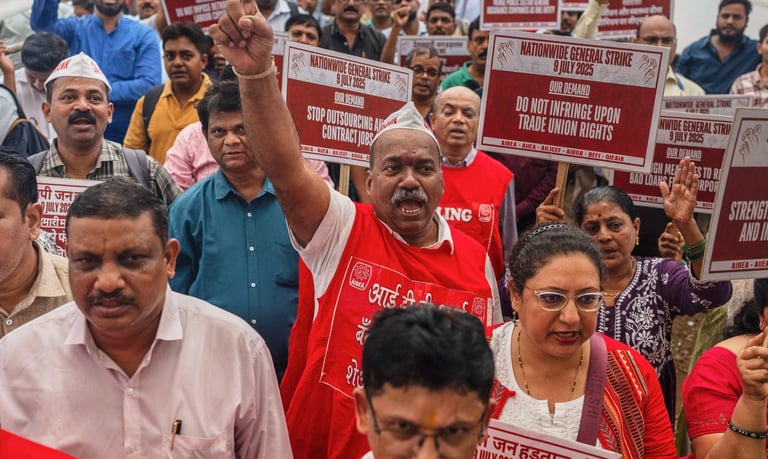Bharat Bandh Today: 25 Crore Workers Strike in Protest Against Labour Reforms & Privatisation
LATEST NEWS


Nationwide Strike: Over 25 Crore Workers Unite for Bharat Bandh on July 9
July 9, 2025 — Today, a powerful Bharat Bandh has been called by a coalition of 10 central trade unions—including AITUC, INTUC, CITU, HMS, SEWA—and backed by farmer and rural labour groups like Samyukta Kisan Morcha. An estimated 25 crore workers are participating in a 24‑hour general strike across formal and informal sectors
Why It’s Sparked Such Wide Support
Unions are protesting the government’s recent four labour codes, which they claim dilute worker protections—making it harder to strike, extend work hours, and limit union rights. They also oppose privatization of public sector undertakings (including defence ordnance factories), contractualisation of jobs, and the rollback of collective bargaining mechanisms .
They’ve presented a 17‑point charter, demanding job creation, reinstatement of old pension schemes, reversal of privatisation, higher minimum wages (₹26,000/month), and protection of farmer interests like MSP and loan waivers What’s Being Disrupted
Banks & financial services: Many branches are closed due to employee absence, potentially affecting cash, cheque clearances, and customer services—particularly in Gujarat
Public transport: Services like buses, ferries, trams, metros, and even some trains are disrupted. For instance, Kerala’s KSRTC saw strikes despite government assurances, and highway disruptions in Odisha and West Bengal were reported
Postal, power, mining, coal & steel: Widespread walkouts across these sectors are disrupting services, with large-scale protests blocking roads and rail tracks in West Bengal and Odisha
What’s Still Operating
Schools, colleges, most private offices, and essential services continue largely unaffected, although transport delays may affect attendance
Why This Matters
Scale of impact: With 25 crore+ participants, this is one of India’s largest coordinated strikes in recent years, challenging major shifts in labour and privatisation policy.
Worker rights under scrutiny: The conflict highlights concerns over weakening labour protections and shrinking space for collective action.
Ripple effects: Banking, transport, public utilities, and rural economies are all feeling the strain, affecting citizens countrywide.